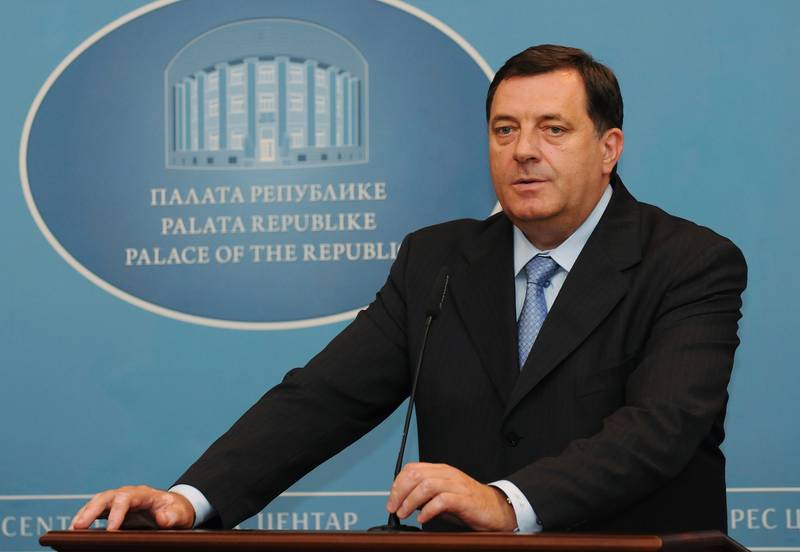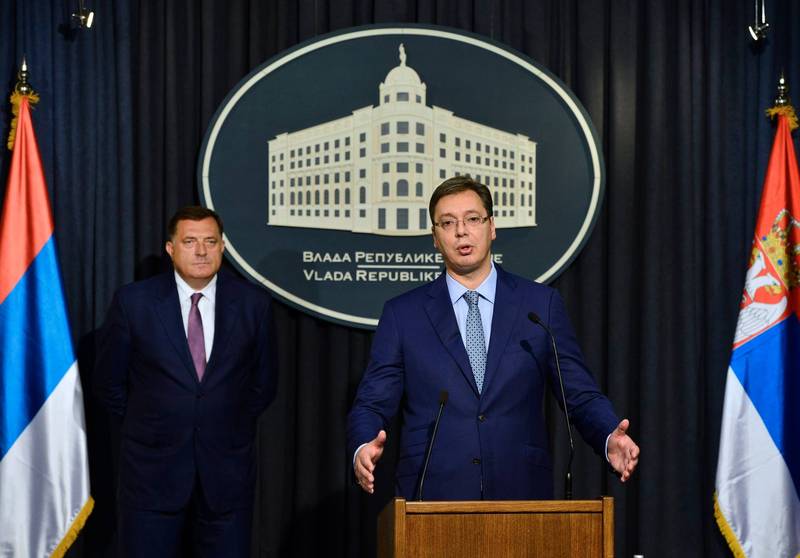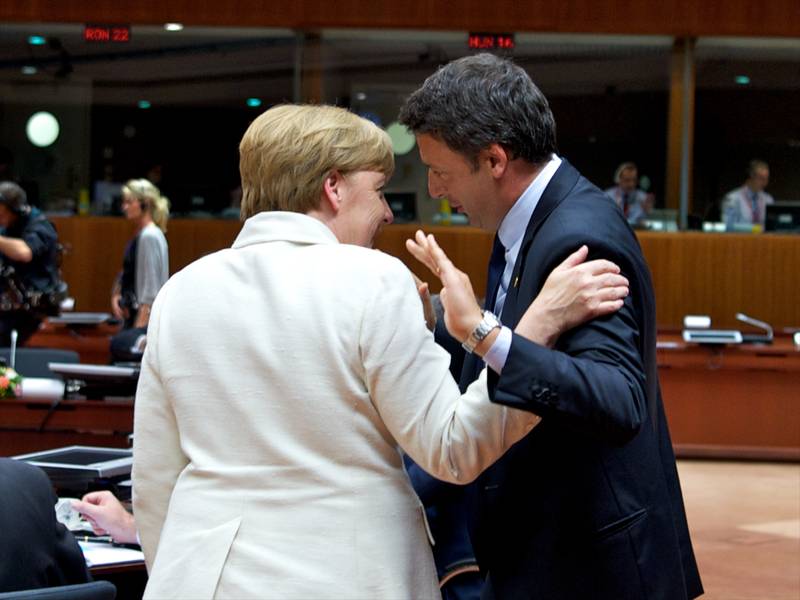The Autumn of Referenda*
Adelina Marini, September 9, 2016
 The previous political season ended with a referendum of large magnitude, which shook the entire European Union, but there are mighty aftershocks and individual local earthquakes expected in the new one, for there are three more referenda coming in seismically active areas for the EU and the Eurozone. And although they look smaller, each of the three has way larger potential to destroy the integrity of the European Union than Brexit.
The previous political season ended with a referendum of large magnitude, which shook the entire European Union, but there are mighty aftershocks and individual local earthquakes expected in the new one, for there are three more referenda coming in seismically active areas for the EU and the Eurozone. And although they look smaller, each of the three has way larger potential to destroy the integrity of the European Union than Brexit.
How much longer can Bosnia and Herzegovina hold?
Perhaps the most dangerous one, not just to EU integrity, but also to peace on the continent is the referendum scheduled for September 25th in the Serbian entity of Bosnia and Herzegovina – Republika Srpska (RS). On that day the citizens of RS will be asked to answer the question “Do you support that the day of January 9th be marked and celebrated as the Day of Republika Srpska?”. On that day, in 1992, the declaration was signed for the creation of the republic within the framework of Bosnia and Herzegovina in the beginning of the war in the country. The declaration was adopted as a reply to the decision of the then federative republic Bosnia and Herzegovina to secede from former Yugoslavia. The decision was voted by Bosniaks (the Muslims) and the Croats in BiH.
Due to concerns that this referendum might serve as a springboard for the next step of the entity under the leadership of its long-standing President Milorad Dodik, namely separation from BiH, it is causing major concerns in the region and led to the ruling of the Constitutional Court of BiH from the autumn of last year that declared the vote anti-constitutional. This, however, did not stop Milorad Dodik one bit, he keeps insisting that the referendum is going to be held, regardless of the criticism and reactions against it. All this is happening in parallel to the efforts of the Dayton state to set a firm foot on the European road in reply to the EU initiative from a year and a half ago.
The referendum in Republika Srpska is the first very large challenge for the integrity of BiH since the signing of the Dayton peace agreement. It is a challenge for EU enlargement policy as well and to the extent to which it can be used as an universal medicine for problems of such character. The situation is made even more complicated by the strong geopolitical element in the referendum, as it also became clear from the reactions coming from neighbouring Serbia and the difficulties of the Peace Implementation Council in BiH to make a decision on the referendum. Under the pressure of its strategic choice, Serbia had to intervene in an attempt to persuade Miroslav Dodik to give up the vote. Serbian Prime Minister Aleksandar Vučić and President Tomislav Nikolić, however, in an attempt to keep the intricate balance between the EU and Russia, came out with no position, but this was completely sufficient to calm the region down. The two leaders stated that they did not support the referendum, but stressed that they would not be interfering with the internal affairs of RS.
The Peace Implementation Council (PIC) is a consulting structure, which is made up of the ambassadors of many countries and organisations, among which are many EU member states, countries from the region, USA, Russia, Saudi Arabia, Egypt, the Council of Europe, etc. PIC was unable to make a decision at one go, but managed last week to vote on a declaration, which was not backed by Russia. The declaration reminds that the BiH Constitution clearly states that rulings of the Constitutional Court are final and binding and the entities must adhere to them. “In this sense, the proposed referendum in Republika Srpska, which requests that voters in RS make a decision on a question, which has already been ruled upon by the Constitutional Court, is destabilising and raises the political tension, which is counter productively diverting attention from much more serious economic and social challenges that BiH is facing. We urge the authorities of Republika Srpska not to hold the referendum”, the declaration says.
serious economic and social challenges that BiH is facing. We urge the authorities of Republika Srpska not to hold the referendum”, the declaration says.
At this stage, the EU is keeping its distance. Answering a question by euinside, the spokesperson of the Union’s external action service Maja Kocijančič announced that the EU is expecting BiH institutions to deal with the problem through the existing judicial processes and through the existing Constitutional framework. “The EU stresses that issue of the RS Day should not distract BiH from the reforms that are necessary to cope with the serious economic and social challenges the country is facing and which are crucial to move forward on the European path.” Alas, the leader of the Serbian entity Mr Dodik is not perturbed by the social economic problems of his country. In an interview for the Serbian weekly magazine NIN he states that from his conversations with citizens he gathers that to them it is more important to gain back their dignity.
In neighbouring Croatia the issue is being watched with concern. The leader of the Croatian Democratic Union (HDZ) – a party of strong influence in BiH – Andrej Plenković – MEP of the EPP group – condemned the referendum in saying that it poses a threat to the integrity and sovereignty of BiH. For euinside the MEP from the Socialists and Democrats group and former foreign minister of Croatia Tonino Picula commented that the scheduled for September 25th referendum is a new attempt at destroying the constitutional order of BiH, but is also a political derivative of the Dayton system. “It has been crystal clear for years that the peace agreement, signed back in 1995 is turning more and more into a pretext for inflaming different conflicts in the country and is less and less a framework, within which BiH can go forward”, says the written reply of Mr Picula.
He is among the many supporters in the country of the re-negotiation of the Dayton agreement, aiming at the creation of a third entity for the Croats. Tonino Picula believes that there is sharp competition among many factors going on in BIH at the moment, who do not wish for a transition from a Dayton to a Brussels phase. He pointed out Milorad Dodik as a prime member of this group, who finds it very important that the “culture of conflict” is maintained as well as the spheres of interest, cemented at Dayton. According to the former Croatian foreign minister, any step towards European transformation of BiH deforms the Dayton construction. “It is obvious how atrophied the institutions of the international community are, whose mission is the implementation of the peace agreement and oversight of the key processes of renovation and functioning of the state”, further writes Tonino Picula, who chairs the EP Delegation for relations with Bosnia and Herzegovina, and for Kosovo.
There is still a chance that the referendum will not be held, but the problem is that it is off the EU radar. The subject was not included officially on the agenda of the informal meeting of EU foreign ministers in Slovakia over the weekend, neither is it scheduled to appear in their programme for the month, as the Slovak presidency of the Union told euinside. And the EP rapporteur on BiH Cristian Dan Preda (EPP, Romania) refused to comment to euinside on the subject. If the referendum is not held, it would give a breath of fresh air to all players, but it would definitely not solve the problem in the long term. The EU relies that BiH placing a foot on the European road will solve the country’s problems. Keeping in mind, however, the amount of time it took BiH to finally negotiate successfully (in the end of August) a coordination mechanism on EU issues, it is far more likely to expect that problems will  continue to overtake the positive effect of European integration and that with such a strong resistance from one of the entities, with Russia’s support at that.
continue to overtake the positive effect of European integration and that with such a strong resistance from one of the entities, with Russia’s support at that.
The EU must not forget it has unfinished work in BiH, but in the entire region as well, which is again in turmoil from its unresolved problems. Up until now the position of the EU has been that it is high time for countries and politicians of the region to start solving their own problems, but this is a position with which the EU is rather washing its hands off its own responsibility. Following the failure of the International Tribunal for the former Yugoslavia, which was supposed to serve justice and lay the foundation of reconciliation in the region, the EU remains the only hope left to people of these countries for the resolution of their problems, including with their own politicians. Counting on them to work it out themselves is irresponsible.
Hungarian dances with European rules
Besides Great Britain, the EU has a strong seismically active area in Central Europe as well. It is right there where the next strong quake is expected, when on October 2nd the referendum in Hungary is to be held. This vote is a direct challenge to both democracy, and to already approved and adopted European legislation. The result could have (although so far only as a demonstration) a far worse effect than the Brexit, where the citizens at least got a legitimate question, while the Hungarian referendum has a highly manipulative question: “Do you want to let the EU determine the resettlement of non-Hungarian nationals in Hungary without the consent of the national parliament?”. The question is manipulative because it overlooks the fact that Hungary has committed in its accession treaty to adhere to European law.
The quota redistribution system for refugees was voted in exactly a year ago in the Justice and Home Affairs Council by regular majority, because of resistance from Hungary and several other member states. According to European law, this is completely sufficient for the new provisions to go into full force. When reviewing the democracy of Viktor Orbán’s exercise it is would be good to keep in mind the fact that at the very beginning of his first term the Hungarian PM attempted to put a leash on the media. In this sense, the result of the referendum is predetermined – it is expected that most citizens will vote “No”, especially after the opposition, represented by the Hungarian Socialist Party, announced that it will support the government in its crusade against migrants, although it is against the referendum in principle and sees it as redundant.

The result of the referendum will not automatically mean that Hungary is free of the commitment to implement European law. It will surely contribute more than the Brexit, however, to the undermining of the European project, which so far rested on its system of values and rules. More and more rules are being violated, however, and the European Commission is even encouraging it with the more and more common exceptions and allowances that it makes for violating member states. Should the Hungarian referendum succeed, regardless of comments on its democratic virtues, it could unleash more votes in other member states against legislation that local politicians advertise as violating national interests. This will for all practical reasons announce the end of the Union.
New quakes in Italy?
The third seismically active area in the EU is in Italy, which is periodically shaken by (unfortunately real as well) earthquakes. In the end of autumn, a referendum is coming there as well. For a change, this one is not against the EU, but could have a highly destabilising effect for the country and thus for the euro area. The date has not been set yet, but Prime Minister Matteo Renzi announced in an interview on Tuesday that the vote will probably be held between November 15th and December 5th. The question that the Italians are called to answer is neither as simple, nor as manipulative as the Hungarian and Bosnian cases, for it concerns a serious constitutional reform. It is about the great institutional change, which Mr Renzi proposed in the very beginning of his term in office (which he did not gain through elections) and was supported by both chambers of Parliament.
The essence of the reform is the reduction of the composition and powers of the Senate. The Italian parliamentary system is quite controversial, for both chambers are practically absolutely equally placed and their functions often overlap, which has in past decades often led to blockages in the political process and government instability. The referendum has long been discussed and thus it is difficult to claim it is part of the modern trends, set by the Brexit, and because of its lagging on the political scene as a subject it started to turn into a challenge for the political survival of PM Renzi, who is attempting a difficult balancing act between national and European politics.
The referendum is turning into a real “Survivor” episode for Renzi after he announced that he will step down if his reform is rejected. Later, he attempted to differentiate the vote from his persona, but it is still too early to tell how effective that will be. In his interview for the “Door to door” show on RAI Uno Matteo Renzi stated that the referendum should not be viewed as the future of a single person, but rather a possibility to minimise the “lazy sods”. Polls so far show a very close outcome, which makes forecasting very difficult. Should the reform be overthrown and Matteo Renzi keeps his promise to step down (as he confirmed for RAI Uno), it could throw Italy into a long period of uncertainty, the more so for having the country’s anti-establishment party “Five Stars”, led by comedian Beppe Grillo, capable of turning out to be the leading political power after  Renzi’s fall, for at the moment there is no other strong personality or political party, which could take the place of the PM and the Democratic Party.
Renzi’s fall, for at the moment there is no other strong personality or political party, which could take the place of the PM and the Democratic Party.
"Five Stars" has contradicting views on the EU and the euro area, which could breed heavy problems for the common currency zone, for the Italian economy is way too large not to drag down the entire euro area, and there are still unsolved problems smoldering in it, some of which have already started to peek out like the case of the Monte dei Paschi bank of Sienna. Besides, Italy is second only to Greece in the public debt to Gross Domestic Product ratio – over 130%. This means that instability in Italy could have serious consequences for the entire euro area. Considering that feelings for the European project are not as strong as before, a possible new heavy euro area crisis could also spell its demise.
Forget about the Brexit!
Those three referenda separately, as well as piled together in a single political season, represent a far greater danger to the survival of the EU, than the Brits' wish to leave. These will be the real challenges for the European project, currently threatened by national and individual political egotisms, by political short-sightedness, and ideological exhaustion. So buckle your seat belts, for this political season is going to be one bumpy ride.
* The title deliberately seeks an analogy with the novel by Gabriel Garcia Marquez "The Autumn of the Patriarch" - dedicated to the solitude of power
Translated by Stanimir Stoev
 Federica Mogherini | © Council of the EU
Federica Mogherini | © Council of the EU | © Council of the EU
| © Council of the EU Luis De Guindos | © Council of the EU
Luis De Guindos | © Council of the EU Bakir Izetbegovic, Andrej Plenkovic | © Council of the EU
Bakir Izetbegovic, Andrej Plenkovic | © Council of the EU Aleksandar Vucic, Recep Tayyip Erdogan | © Serbian Presidency
Aleksandar Vucic, Recep Tayyip Erdogan | © Serbian Presidency Jean-Claude Juncker, Zoran Zaev | © European Commission
Jean-Claude Juncker, Zoran Zaev | © European Commission